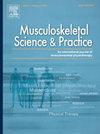Confidence and knowledge of Brazilian physiotherapists and physiotherapy students in managing patellofemoral pain
IF 2.2
3区 医学
Q1 REHABILITATION
引用次数: 0
Abstract
Background
Previous research has explored clinicians' knowledge and confidence in managing patellofemoral pain (PFP), highlighting gaps in alignment with current evidence. However, there is limited research on Brazilian clinicians and physiotherapy students in this context.
Objectives
To evaluate the knowledge and confidence of Brazilian physiotherapists and physiotherapy students in managing PFP and identify barriers to accessing scientific resources.
Design
Cross-sectional online survey study.
Method
We electronically recruited Brazilian physiotherapists and physiotherapy students. The Qualtrics survey included Likert-based and open-ended questions on demographics, confidence in PFP management, and knowledge related to PFP diagnosis, risk factors, prognosis, and treatment. Responses were compared to current evidence, and between-group differences were analyzed.
Results/findings
A total of 46 physiotherapists and 51 students participated. Most physiotherapists were confident in managing PFP, but students were not. While most physiotherapists (93.4%) and students (86.3%) correctly defined PFP, only physiotherapists aligned with evidence-based diagnostic criteria. Both groups identified quadriceps weakness as a PFP risk factor but incorrectly cited hip weakness and dynamic knee valgus. Both groups correctly endorsed hip and knee exercises, physical activity modification, and load management as treatment strategies; however, 63.1% of physiotherapists incorrectly recommend knee brace for pain relief. Participants reported barriers to accessing scientific resources, including language, access difficulties, and searching knowledge gaps.
Conclusions
Brazilian physiotherapists reported high confidence and accurate knowledge in managing PFP, but still held inaccurate beliefs about its risk factors and prognosis. Physiotherapy students demonstrated a need for further education. Important barriers limit their ability to stay informed on current evidence.
巴西物理治疗师和物理治疗学生管理髌骨痛的信心和知识
之前的研究已经探索了临床医生在管理髌骨股痛(PFP)方面的知识和信心,强调了与当前证据一致的差距。然而,在这方面,对巴西临床医生和理疗专业学生的研究有限。目的评估巴西物理治疗师和物理治疗专业学生在PFP管理方面的知识和信心,并确定获取科学资源的障碍。设计横断面在线调查研究。方法通过电子方式招募巴西物理治疗师和物理治疗专业学生。质量调查包括基于李克特的开放式问题,包括人口统计、对PFP管理的信心、PFP诊断、风险因素、预后和治疗相关知识。将反应与现有证据进行比较,并分析组间差异。结果/发现共46名物理治疗师和51名学生参与。大多数物理治疗师对治疗PFP有信心,但学生没有。虽然大多数物理治疗师(93.4%)和学生(86.3%)正确定义了PFP,但只有物理治疗师符合循证诊断标准。两组都认为股四头肌无力是PFP的危险因素,但错误地引用了髋关节无力和动态膝外翻。两组都正确地支持髋关节和膝关节锻炼、身体活动调整和负荷管理作为治疗策略;然而,63.1%的物理治疗师错误地推荐膝关节支架来缓解疼痛。与会者报告了获取科学资源的障碍,包括语言、获取困难和搜索知识空白。结论巴西物理治疗师对治疗PFP有很高的信心和准确的知识,但对其危险因素和预后仍有不准确的认识。物理治疗专业的学生表现出进一步教育的需要。重要的障碍限制了他们了解当前证据的能力。
本文章由计算机程序翻译,如有差异,请以英文原文为准。
求助全文
约1分钟内获得全文
求助全文
来源期刊

Musculoskeletal Science and Practice
Health Professions-Physical Therapy, Sports Therapy and Rehabilitation
CiteScore
4.10
自引率
8.70%
发文量
152
审稿时长
48 days
期刊介绍:
Musculoskeletal Science & Practice, international journal of musculoskeletal physiotherapy, is a peer-reviewed international journal (previously Manual Therapy), publishing high quality original research, review and Masterclass articles that contribute to improving the clinical understanding of appropriate care processes for musculoskeletal disorders. The journal publishes articles that influence or add to the body of evidence on diagnostic and therapeutic processes, patient centered care, guidelines for musculoskeletal therapeutics and theoretical models that support developments in assessment, diagnosis, clinical reasoning and interventions.
 求助内容:
求助内容: 应助结果提醒方式:
应助结果提醒方式:


